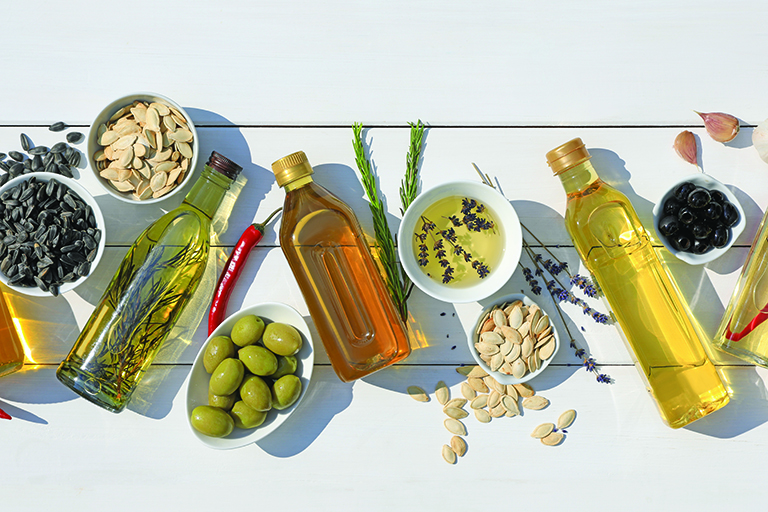Seed oils – such as sunflower, canola, soybean and flaxseed oils – are staples in many kitchens around the world. Many people prize them for their versatility, affordability and neutral flavors. However, health experts and researchers are engaged in a growing debate about their health impacts. Let’s take a look at the pros and cons.
The Pros
Rich in Essential Fatty Acids: Many seed oils, like flaxseed oil, are high in omega-3 and omega-6 fatty acids, which are essential for brain function, cell growth and reducing inflammation when consumed in the right balance. Omega-3 fatty acids are crucial for a healthy heart and have been proven to lower the chances of heart disease. Balancing these fatty acids in your diet is essential for regulating inflammation, supporting overall well-being, and maintaining optimal health.
Source of Vitamin E: Seed oils, such as sunflower oil, are rich sources of vitamin E, a potent antioxidant that plays a crucial role in protecting cells from oxidative damage, bolstering immune function and promoting overall health by combating free radicals. Vitamin E also promotes healthy skin and eyes and plays a role in preventing chronic diseases by combating oxidative stress.
Heart Health Benefits: When used in moderation, seed oils with high monounsaturated fat content, like canola, may help reduce bad cholesterol levels, supporting cardiovascular health. Studies suggest that replacing saturated fats with unsaturated fats from seed oils can reduce the risk of heart attacks and strokes.
Culinary Versatility: Seed oils have high smoke points, making them suitable for various cooking methods including frying, sautéing and baking. Their neutral flavor makes them an ideal base for salad dressings, marinades and baked goods, providing flexibility in both everyday cooking and gourmet recipes.
The Cons
High in Omega-6 Fatty Acids: Many seed oils contain a higher proportion of omega-6 fatty acids compared to omega-3s. Excessive omega-6 intake relative to omega-3s may contribute to chronic inflammation and related health issues, including arthritis, heart disease and autoimmune conditions. Balancing these fats is crucial to minimizing potential negative health effects.
Refining Process: Most seed oils are highly processed, involving chemical solvents and high heat. This refining can strip oils of beneficial nutrients and introduce harmful byproducts, such as trans fats.
Opt for minimally processed oils, such as cold-pressed flaxseed or sesame, which retain more nutrients and are free from chemical residues.

Choosing minimally processed or cold-pressed oils is beneficial as it can help reduce these risks, all the while maintaining the nutritional integrity of the oils.
Risk of Oxidation: Some seed oils, especially those rich in polyunsaturated fats, are prone to oxidation when exposed to heat, light or air. Oxidized oils can produce harmful free radicals, potentially damaging cells and tissues. These harmful free radicals are associated with aging, cancer and neurodegenerative disorders.
Calorie Density: Like all fats, seed oils are calorie-dense. Overconsumption can lead to weight gain and other health issues, especially when combined with a sedentary lifestyle. Awareness of portion sizes and total caloric intake is essential to prevent overuse. In order to maintain a healthy diet, it is important to use seed oils in moderation and balance them with other nutrient-dense foods. Additionally, choosing oils that are less prone to oxidation, such as olive or coconut, can help reduce the risk of harmful free radical production.
Incorporating Seed Oils into a Healthy Diet
Choose Cold-Pressed or Unrefined Oils: Opt for minimally processed oils, such as cold-pressed flaxseed or sesame, which retain more nutrients and are free from chemical residues. These oils often have richer flavors, making them excellent for salad dressings and dips.
Balance Omega-6 and Omega-3 Intake: To maintain a healthier fatty acid ratio, combine seed oils with omega-3-rich foods like fatty fish, chia seeds or walnuts. For instance, drizzle flaxseed oil over a salad while including salmon as a protein source for a balanced meal.
Use Appropriately
For high-heat cooking, select stable oils such as canola or avocado that are resistant to oxidation.
For salad dressings and drizzling purposes, opt for delicate oils such as flaxseed or walnut oil to retain their nutrients and enhance the flavors of your dishes. These oils work well in cold dishes to enhance flavor and nutrition.
Watch Portion Sizes: Moderate your consumption of seed oils to avoid excessive calorie intake and ensure a balanced diet. Limiting your use to a tablespoon or two per meal is usually adequate to enjoy the benefits of seed oils without overconsumption. Measuring oil while cooking or using a spray bottle can help control portions and reduce waste.
Store Properly: Store oils in dark, cool places to shield them from light and heat, prolonging their shelf life and preventing rancidity. Opt for smaller bottles to preserve freshness, minimize waste and ensure the quality. To prolong the shelf life of delicate oils such as flaxseed or hemp seed, consider refrigerating them to maintain their freshness and prevent rancidity.

Balance, moderation and mindful selection are key to reaping the benefits of seed oils while minimizing potential downsides.
Diversify Your Fats: Don’t rely solely on seed oils. Including other healthy fat sources like olive oil, coconut oil, avocados and nuts not only provides a variety of nutrients but also ensures a balanced intake of essential fatty acids and micronutrients for overall health. Using a mix of oils ensures a broader range of flavors and health benefits in your diet.
Experiment with New Recipes: Incorporate seed oils into innovative dishes, such as adding sesame oil to stir-fries for a nutty aroma or using grape seed oil in homemade mayonnaise for its light texture. Trying new recipes can make healthy eating more enjoyable.
Educate Yourself About Labels: To ensure the quality of seed oils, it is essential to look for labels that specify “cold-pressed,” “expeller-pressed” or “organic”. Avoiding products with added artificial preservatives or flavorings is crucial, as these additives can diminish the health benefits of the oil and compromise its quality.
Conclusion
When chosen and used wisely, seed oils can be a beneficial part of a healthy diet. By understanding their advantages and limitations, you can make informed choices that align with your health goals. Balance, moderation and mindful selection are key to reaping the benefits while minimizing potential downsides.














